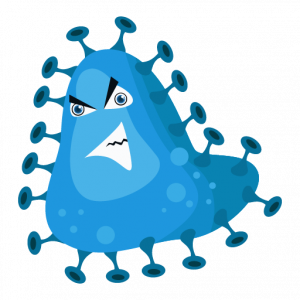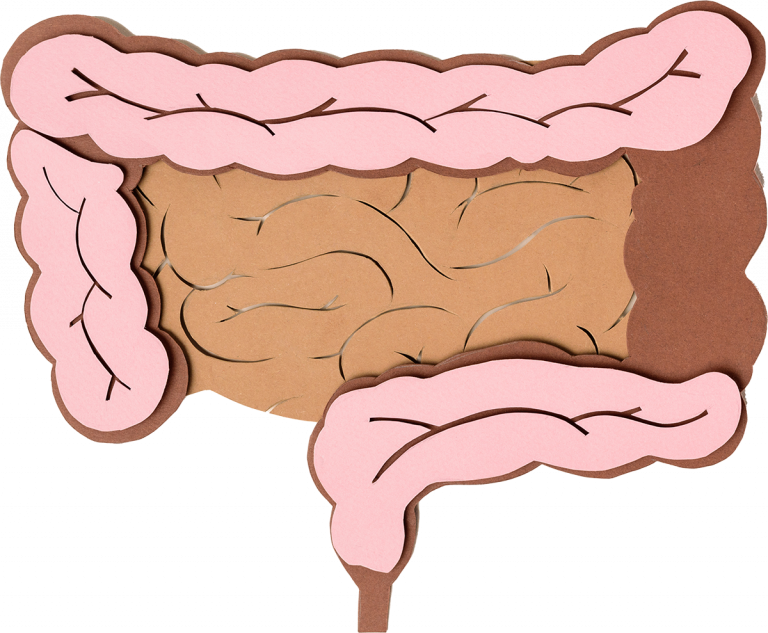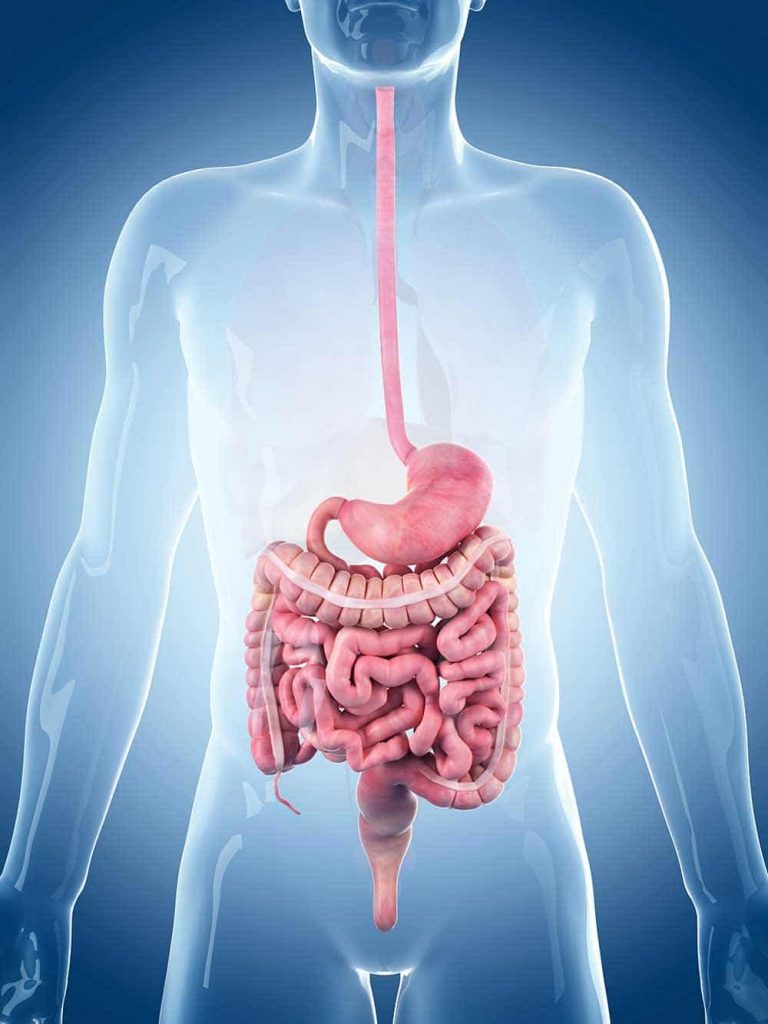Types of Gut Bacteria
Trillions of bacterial helpers live in your gut and they have an incredibly important job to do every single day in order to ensure that you remain fit and well. Discover more about your gut ecosystem here!
Contents

Firmicutes
- the "bad" bacteria
These bacteria can break down indigestible dietary fibre particularly efficiently – namely into many so-called “short-chain” carbohydrates. This creates many simple sugar molecules in the intestine, which are quickly absorbed by the body and immediately stored in the form of fat deposits for “times of need”. An overabundance of firmicutes means that up to 12% more calories are absorbed from each meal. This isn’t ideal for losing weight. These bacteria have the ability to switch our body to economy mode in “times of hunger” and to consume as few calories as possible during fasting days. As soon as sufficient food is available again, the yo-yo effect occurs, every calorie is taken from the food.
VS

Bacteroidetes
- the "good" bacteria
Our food today often contains more sugar than our body needs. Bacteroidetes bacteria recognise this unhealthy diet for humans, as sugar can be converted very quickly into alcohol, which then damages the liver. They encapsulate directly in the intestine so that the “excess” can be transported away with the stool.
This is also confirmed by stool analyses: if the intestinal flora is rich in Bacteroidetes bacteria, our stool contains more unused calories than if there is an excess of Firmicutes.
Ideally, Bacteroidetes and Firmicutes are present in a 1:1 ratio. In people who are overweight, the Firmicutes strongly dominate
Imbalanced gut flora
In order to master the multitude of tasks, our intestinal wall needs a powerful protective barrier. An army of billions of beneficial bacteria ensures that harmful microorganisms cannot settle in our intestines. The following causes can lead to the sensitive micro-organisms of our intestines becoming unbalanced:
- persistent physical and mental stress situations, which can lead to inflammation in our intestines
- wrong eating habits and insufficient exercise
- Medications such as antibiotics, which destroy healthy intestinal bacteria in addition to the germs that cause disease.
A disturbed intestinal flora can have a number of effects on our physical and psychological well-being. The following complaints can occur when the microorganisms of our intestines are stressed:
Intestinal disorders such as diarrhoea, constipation, flatulence, abdominal pain.
Chronic inflammatory bowel diseases such as Crohn's disease and ulcerative colitis
Irritable bowel syndrome
Food intolerances such as coeliac disease
Development of allergies
Psychological stress

Your Gut
The intestine is the largest organ in the human body. It is eight metres long and consists of millions of villi. These are thin, finger-shaped protrusions that form an impressive intestinal surface the size of two tennis courts (approx. 400m²) inside our abdominal cavity. This makes the intestine the largest contact surface of the body with the outside world.

Facts & Figures
- 100 trillion bacteria colonise every single human being, most of them living in our intestinal walls.
- There are 10 times more bacteria living in our intestines than cells that make up our body.
- The microbes in our intestines weigh up to 2 kilograms.
- Around 30 tonnes of food and 50,000 litres of fluid are processed by it in the course of our lives.
- The intestine is supported by more than 500 species of bacteria.
- 80% of our immune system is anchored in the gut.
- Our digestive tract is home to 100 million nerve cells – more than the spinal cord – and is therefore often referred to as the “gut brain“.
- More than 20 hormones are produced in the gut, including the happiness hormone serotonin and the sleep hormone melatonin.
Our health begins in the gut
Only when our digestive system is working, do we feel well. This is because the intestine is a sensitive network of nerves and controls 80% of all metabolic processes in our body. This is why our intestines are also called the “centre of well-being”. The intestinal flora (intestinal microbiota) is formed by trillions of industrious bacteria that take on a variety of tasks every day:
- Breaking down food
- Absorption of vitamins and minerals
- Production of vitamins, enzymes and amino acids
- Elimination of “harmful” food components
- Production of 80% of our immune cells
- Production of virus- and bacteria-killing proteins (“immunoglobulins”)
- Defence against pathogens and toxins

The size of the intestinal surface of 400 m² is achieved by the formation of folds, villi and microvilli in the mucosa.
Our intestinal flora consists of trillions of intestinal bacteria
At first glance, the intestines, lungs, skin, brain and reproductive organs do not have much in common. But a closer look reveals that those tiny little bacteria that colonise our bodies have a great influence on every single one of our cells and act like a protective battalion in many areas.
Tips to support your gut flora

Support
your "good" bacteria“
- Sufficient fluids (at least 2 litres daily).
- Fibre-rich diet: raw fruit with peel and vegetables (beans, peas, lentils, fennel, celery, cabbage). Try stirring chia or linseed into yoghurt or muesli (exception: irritable bowel patients).
- Use prebiotics that promote the growth of special types of bacteria.
- Take indication-specific probiotics that survive stomach and bile acids and reach the intestine.
VS

Reduce
your "bad" intestinal bacteria!
- Avoid sugar if possible.
- Reduce salt consumption. Healthy alternatives for seasoning: cumin, paprika, rosemary, chilli, thyme, bay leaf and ginger.
- Reduce meat consumption – especially red meat.
- Drink alcohol in moderation.
- Stop smoking: Nicotine can lead to bowel cancer, among other things.
- Antibiotics: Always take probiotics alongside medication to prevent greater damage to the intestines.
Need help finding the right product?
Consult the OMNi-BiOTiC® Team
Are you looking for the right multispecies probiotic for your problems? Or are you looking for specific vitamins and minerals? Get in touch with our customer support team!
Any questions? Contact us!
Our highly-qualified consultant team is made up of doctors, pharmacists, biologists, nutritionists and microbiologists. Contact us to get advice regarding our products, your intestines, as well as your microscopic inhabitants.

Help & Advice
Institut AllergoSan
EU
OMNi-BiOTiC® − Blog
Stay informed!
Read more interesting articles about our gut and get tips for your gut health!
OMNi-BiOTiC® − Blog
Stay informed!
Read more interesting articles about our gut and get tips for your gut health!
OMNi-BiOTiC®
Our intestinal bacteria perform at their best every day. Unhealthy diets, stress or medication can change our intestinal flora. The targeted supply of specially selected strains of bacteria – called probiotics – supports our intestines in every phase of life: while taking antibiotics, in particularly demanding times or as a daily go-to for the whole family.
OMNi-LOGiC®
The intestine is the health centre of our body: billions of intestinal bacteria work every day to ensure that digestion and the body’s defences function optimally. In order for these useful helpers to feel at home and fulfil all their important tasks, they need specific dietary fibres as a food source, such as those contained in prebiotics.
META-CARE®
Many individuals struggle to obtain sufficient vitamins, minerals, and trace elements through their diet. Additionally, particularly during periods of elevated stress and heightened mental or physical strain, the body’s demand for nutrients intensifies. The body’s functions can be aided by taking high-quality micronutrients and plant extracts, enhancing your overall health and well-being.
OMNi-BiOTiC® − for a good gut feeling every day
The secret of OMNi-BiOTiC®’s success lies in its innovative formulation and high-quality standards. These are top priorities in developing probiotics and ensuring tangible benefits for users.











